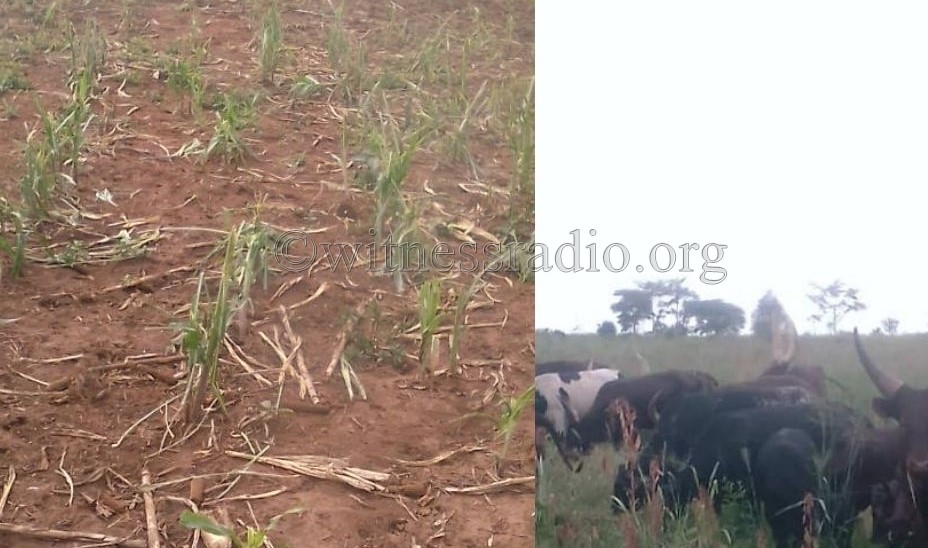A herd of cattle after destroying a local resident’s maize plantation.
By witnessradio.org Team
Kiryandongo – Uganda – As natives continue to resist illegal evictions, multinational companies opt to hire livestock as a new tactic to forcefully evict smallholder farmers from their land.
Ever since the government of Uganda announced the second lockdown, on 6th June 2021, to curb the spread of COVID-19 and a blanket lockdown further on June, 18th 2021, dozens of local farmers are crying foul for their gardens that have been ravaged their gardens and destroyed food crops by animals brought by multinationals including Agilis Partners Limited.
On June, 18th 2021, on top of the closure of schools and a ban on inter-district travels, closure of courts, the government announced a total ban on both private and public transport, reduced human workforce presence in public offices to 10, and announced a stay home for 42 days.
The violence from multinationals, which started with the arbitrary arrest of four people including two community land rights defenders; Baluma Sepriano, and Martin Munyansi, has now spread to gardens owned by smallholder farmers, which have been a food basket in the presence of the lockdown.
It is important to note that since 2017, families whose land is targeted by multinationals have experienced cruelty ranging from rape, defilement, and gender-based violence as a tool to evict women and girls, houses have been torched, kidnaps, torture, arbitrary arrests, to beatings, among others.
Witness Radio – Uganda findings, indicate that Agilis Partners Limited is one of the multinationals that has allegedly hired cattle to destroy the communities’ food baskets and cause hunger to evictees, which in the end the situation at hand would force poor communities off the land. Other multinational companies include the Great Season SMC Limited and the Kiryandongo Sugar Limited.
Since the second lockdown started, about 15 homesteads have lost family gardens to animals. The 15 homesteads are owned by individuals who are part of the 35000 that are forcefully being evicted by three multinationals. More than half of the evictees have lost their farmland to multinationals as more land is acquired by force.
Mr. Samuel Kusiima is among the residents affected, he said all his crops including maize, beans, banana plantations, and groundnuts have been destroyed.
The 45 year- old’s dream was to build a better house for his family after the harvest but all this was shuttered by the Balaalo’s invasion.
“Look at my house, it is leaking, I bought seeds with my hard-earned money intending to construct a better house but all of my crops have been destroyed,” he added.
Mr. Kusiima fears that their families are at risk of being attacked by famine since they are left with nothing to feed on.
“We don’t have anywhere to get food and these people do not mind, they say they paid for the land. This is to force us to vacate our land for large scale plantations but we shall not,” he added
M/s Harriet Mbabazi, another resident, says the pastoralists locally known as Balaalo invade her land at night with their animals and graze on her food crops.
“The first time they came was at around 2:00 AM in the night, I heard a loud noise and at first I thought they were buffalos passing. When the sound could not stop, I decided to sneak through the window to see what was happening. This is where my eyes landed on a large herd of cattle in my garden. I did not know who owned the cattle but I had heard of several other villagers before complaining about the cows” Mbabazi added.
“I had over 56 acres but the 53 were taken by the company, with only 3 acres of land, and all I had planted was destroyed. This is our land, we are Ugandans and they found us here. We shall not leave it and we are ready to defend it. What do they want us to do!” she further added.
To understand the amount of money Balaalo paid, the size of land they will be working on and the amount of time/ number of seasons they will take while using the land, Witness Radio – Uganda contacted the manager of the company Mr. Odong Sam for the truth of the matter, but he refused to comment. Instead, he invited Witness Radio – Uganda to their offices.


 MEDIA FOR CHANGE NETWORK2 weeks ago
MEDIA FOR CHANGE NETWORK2 weeks ago
 FARM NEWS2 weeks ago
FARM NEWS2 weeks ago
 MEDIA FOR CHANGE NETWORK1 week ago
MEDIA FOR CHANGE NETWORK1 week ago
 MEDIA FOR CHANGE NETWORK1 week ago
MEDIA FOR CHANGE NETWORK1 week ago
 MEDIA FOR CHANGE NETWORK4 days ago
MEDIA FOR CHANGE NETWORK4 days ago
 MEDIA FOR CHANGE NETWORK6 days ago
MEDIA FOR CHANGE NETWORK6 days ago
 MEDIA FOR CHANGE NETWORK2 days ago
MEDIA FOR CHANGE NETWORK2 days ago
 MEDIA FOR CHANGE NETWORK2 days ago
MEDIA FOR CHANGE NETWORK2 days ago
























